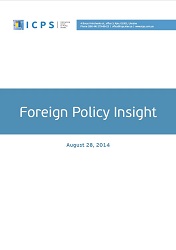
Foreign Policy Insight, Issue 2014 - 02
Foreign Policy Insight, Issue 2014 - 02
Keywords: Russian aggression against Ukraine;
More...
Keywords: Russian aggression against Ukraine;
More...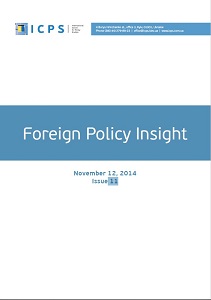
Keywords: Minsk agreements; US and European dilemma; Peace dialogue instead of military conflict ;
Foreign Policy Strategies and Decisions // Is a peaceful settlement possible? // The deadlock // Disposition of the parties // Will Astana take place? // Is there a way out? // Multilevel nature of the conflict // Peaceful dialogue instead of military conflict // Regional and global focus: implications for Ukraine // Syrian shifts and the Ukraine-Russia conflict
More...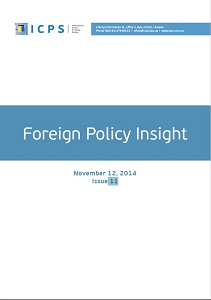
Geopolitical chessboard: The Syrian crisis and Ukraine. Is there a connection?
More...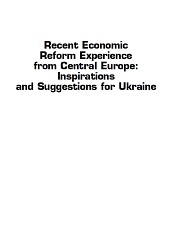
This publication consists of articles written by experts from Visegrad countries (CzechRepublic, Hungary, Poland, and Slovakia) and features these countries’ experience in economic reforms on their strategic paths to EU accession. This publication was prepared as part of the “Transferring Slovak Economic Reform Know-How during Pre-Election and Post-Election Debates in Ukraine” project, a joint initiative of the Institute for Economic and Social Reforms INEKO (Bratislava, Slovakia) and the International Centre for Policy Studies (Kyiv, Ukraine). The main goal of this project is to promote further economic growth and alleviate poverty in Ukraine through improved economic reform policy design and implementation.
More...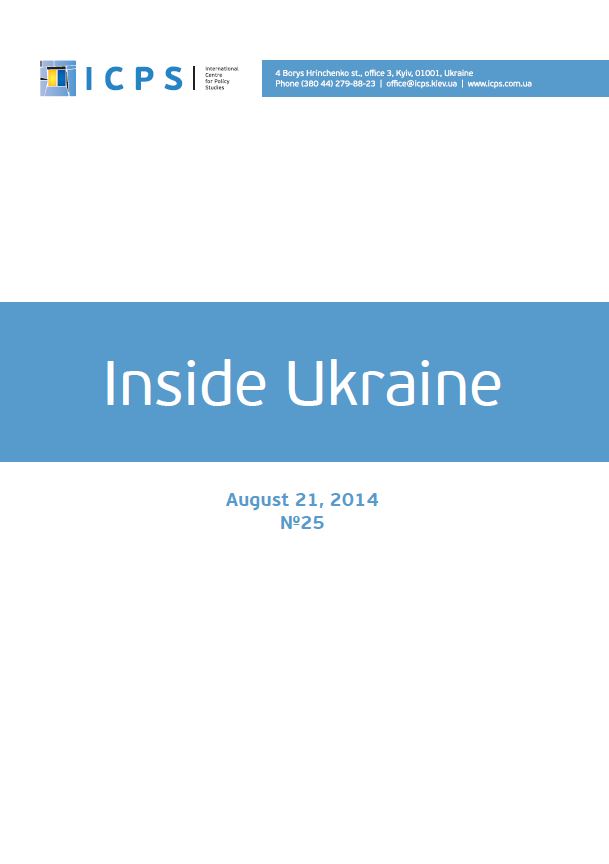
The Government Policy // Russia’s support to militants increases the number of victims in Ukraine // Lustration which is impossible to implement // Economic Situation // Drop of FDI and industrial production in Ukraine // Verkhovna Rada adopted the law “On sanctions” // MPs adopted the law on management of gas transportation system // Political Competition // Pro-presidential party is a current front-runner at early parliamentary elections // «An independent game» of Arseniy Yatseniuk and Oleksand Turchynov // With start of electoral campaign Tymoshenko will return to public politics
More...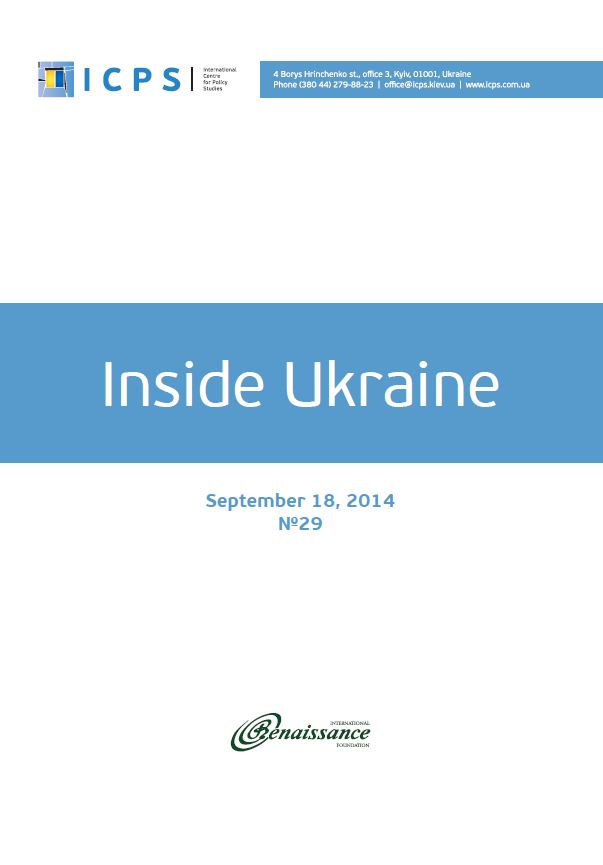
The Government Policy // Poroshenko makes concessions to separatists // 100 days of Poroshenko’s presidency // Economic Situation // Implementation status of Poroshenko’s “economic” promises for the first 100 days // Budget cannot be object of government manipulations // Reform or tax pressure increase? // Political competition // Traditional approach to Petro Poroshenko’s party list design // “People’s Front” is set to participate in elections independently // “Batkivshchyna” makes a successful PR-trick
More...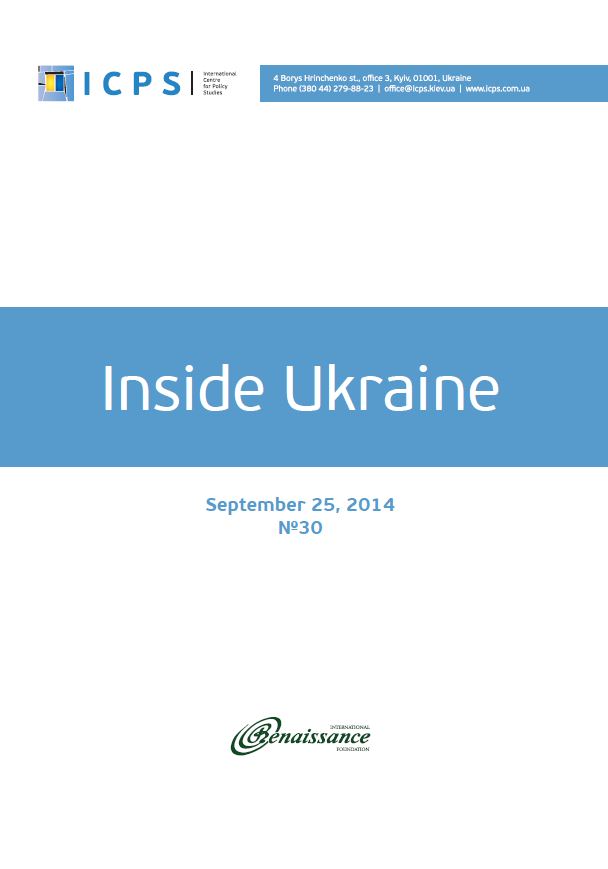
The Government Policy // Shaky truce in Donbas // Reform of MIA in Facebook // Economic Situation // Ukraine’s economy continues its fall // NBU changes rules on FX market // Russia extends trade war against Ukraine // Russia set itself to destroy Ukrainian energy system // Political competition // Oleh Lyashko’s electoral jackpot // Serhiy Tihipko is uniting big business
More...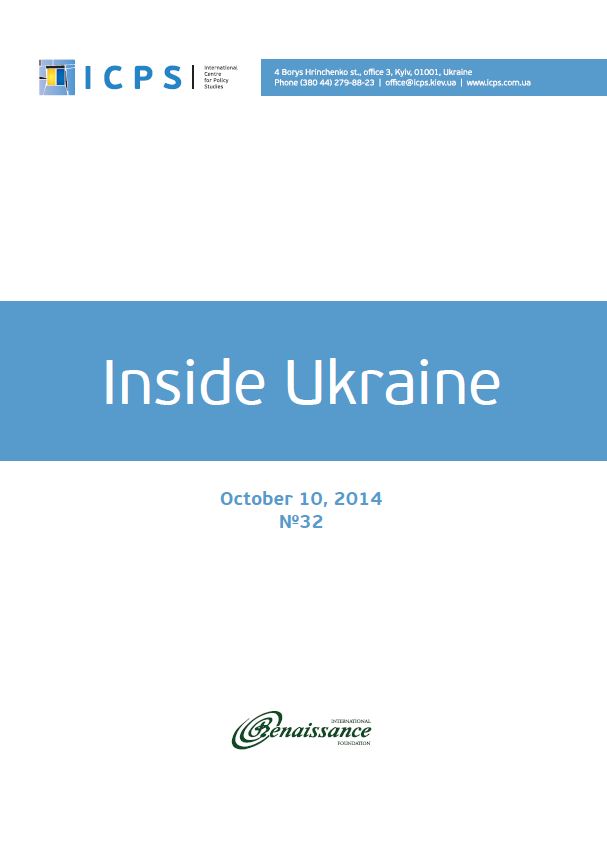
The Government Policy // Four hot spots on the Donbas map // Chances to punish the guilty of Maidan crimes fade away // Economic Situation // The World Bank once again lowered forecast for Ukraine’s GDP growth // NBU introduced indicative FX rate // The light at the end of Ukrainian-Russian gas tunnel // Political competition // Petro Poroshenko’s programs at presidential and parliamentary elections are the same // Radical party: there is no such notion as too much populism during elections // “Batkivshchyna” offers to hold negotiations with Russia from the position of a strong power // Security is a major focus of “Civil Position” // Economic focus of “Strong Ukraine” program
More...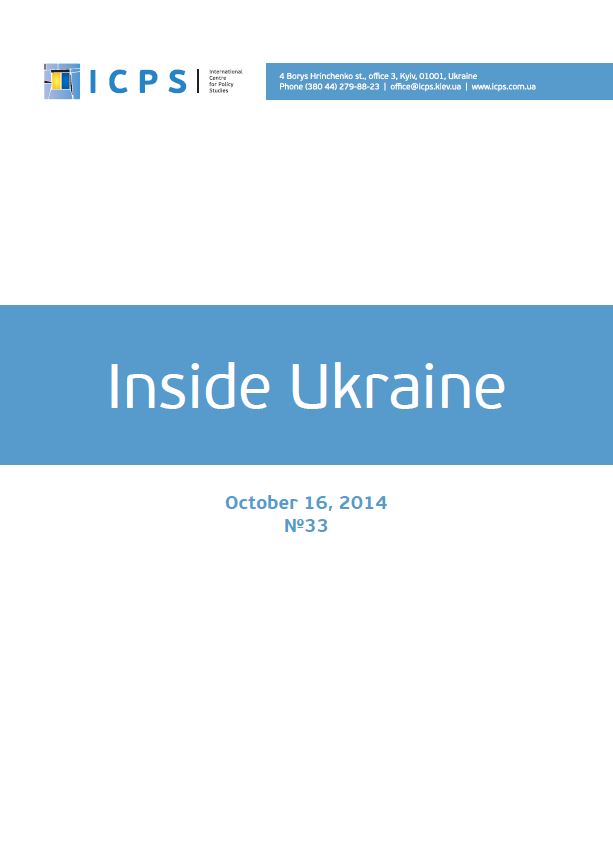
The Government Policy // The President summed up the peace plan implementation // A breakthrough in anti-corruption legislation // Economic Situation // Donbass losses from Russian aggression // Separatists seek “energy autonomy” // Political competition // Diversification “Privat-style” // Increasing role of Serhiy Lyovochkin
More...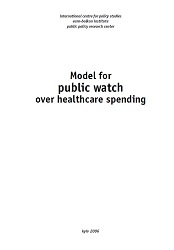
In Ukraine today, the environment for a dialog between the state and citizens on public control over public healthcare spending is almost entirely lacking. The reason for this is the absence of the necessary mechanisms, institutions, procedures and practices for public participation in the decision-making process within authorities. But extending democratic principles to healthcare is one way to improve publicpolicy in this area and raise the health of Ukrainian society in general. The development and institution of public control over public healthcare spending should be a reform priority. This, in turn, requires a set of clear, understandable and transparent rules and procedures. This manual presents a practical model for public control over public healthcare spending. The main requirements attached to this model are described in terms of legal and institutional arrangements for public control, the dissemination of information and the participation of NGOs in mobilizing the general public. Jointly prepared by specialists from the Euro-Balkan Institute (Macedonia), the Public Policy Research Center (Kazakhstan), and the International Centre for Policy Studies (Ukraine), the uniqueness of this publication lies in the fact that, during its preparation, public policy tools used in the European Union, Central Europe and Central Asia were examined.
More...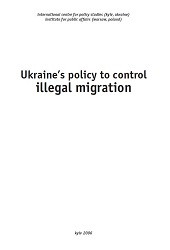
This White Paper proposes an alternative, independent vision of state policy for controlling illegal migration in Ukraine. This is the final report from the “Improving the Implementation of Migration Policy by Disseminating EU Experience with Readmission Treaties” Project implemented by the International Centre for Policy Studies (Kyiv, Ukraine) and the Institute for Public Affairs (Warsaw, Poland), with support from the Embassy of the UK in Ukraine. This document also contains recommendations for institutional reform, legislative changes, and drawing on technical assistance, as well as proposals for specific polices and programs in migration control and border management. The report also proposes responses to challenges associated with signing a Readmission Treaty with the EU: recommendations on creating conditions for the detention of illegal migrants, ensuring them legal protection, and carrying out identification and expulsion procedures. Moreover, this paper also lays out reforms that are needed to improve the effectiveness of Ukraine’s migration policy: reforms in the Ministry of Internal Affairs (MIA) and the judiciary.
More...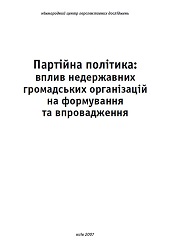
In the recent history of Ukraine, 2006 will be the year of constitutional changes in the political system of the country. In accordance with the Law “On Amendments to the Constitution of Ukraine ” on December 8, 2004, our state became a Parliamentary Presidential. For the first time elections to the Parliament and deputies of local self- government bodies were held according to proportional system. Introduction of a new form of government provides a number of changes in various spheres of public life. Especially in the political sphere that organically combines political structures of the state and civil society, political relations, political activity, political consciousness. These changes concern first of all interaction of the mainstructures of the political system - the state, political parties, public organizations, local government and media.
More...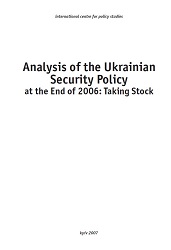
On the surface, 2006 has seen major changes to the way defense and security issues are approached by both the government and the public. This is primarily because of the high level of attention that has been devoted to the topic of NATO membership, which has become the subject of a bitter political struggle. When Prime Minister Viktor Yanukovych announced in September that Ukraine would not be seeking a Membership Action Plan (MAP) at the Riga Summit in November 2006, this seemed to emphasize the fact that the new government had a different approach to defense, security and foreign policy issues.
More...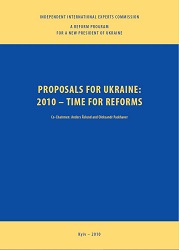
Ukraine has gone through a rollercoaster in the last decade. Eight years of an average economic growth of 7.5 percent from 2000 until 2007 has been followed by severe economic crisis, with gross domestic product (GDP) anticipated to slump by 14 percent in 2009. Ukraine’s presidential elections offer a grea topportunity to launch a major revitalization of the country. Ukraine is not performing up to its potential. In 2009, the International Monetary Fund (IMF) assessed that its GDP per capita will be as little as $2,540 in current US dollars, placing it 110th in the world. The situation looks only marginally better when GDP is expressed in purchasing power parities, which reflects the actual living standard: $6,460 per capita, at 99th place in the world. In purchasing power parities, Ukraine’s GDP amounted to 22 percent of the European Union (EU) level and 40 percent of the Russian level in 2009.
More...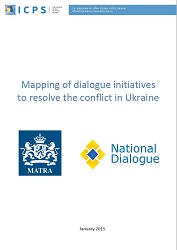
The document “Mapping of dialogue initiatives in Ukraine” has been prepared within the “Initiating the Participatory National Dialogue in Ukraine” project in Ukraine and implemented by the International Centre for Policy Studies (ICPS) with the financial support of the Matra social transformation program (government of the Netherlands). While preparing this document, experts aimed at gathering, describing and analyzing existing initiatives designed to hold a dialogue between social groups or communities that have different views on the conflict in Ukraine. Dialogue initiatives between residents of different regions of the country, displaced persons and locals, enforcement authorities and people affected by their actions are among them. The fact that these projects are in different stages of implementation should be considered. Some of them have already been completed, others were implemented as pilot projects, whereas a number of them are still at the development stage or need support.
More...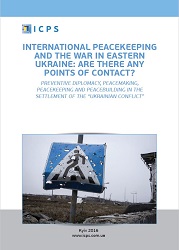
The Minsk agreements contributed to the transformation of the war in eastern Ukraine into a conflict of low intensity but did not lead to the restoration of peace, or even a sustainable truce. Within the existing negotiation processeither the Trilateral Contact Group or the “Normandy Four” format – the parties failed to propose an effective way to restore peace and the territorial integrity of Ukraine. Additionally, the logic of the negotiation process set by the Minsk agreements has a very limited capacity to achieve results that are in the interests of our country. Currently, international participation in the conflict settlement is limited to the monitoring of the conflict and the facilitation of OSCE contact group activities. Meanwhile, some forms of international engagement that are officially requested by Ukraine cannot be used in the present situation and the state of conflict, and other forms are just ignored. This research is intended to outline the existing forms and means of international peacekeeping activities, explain their compliance with the existing settlement process and propose a number of ideas to enhance the use of diplomatic tools to resolve conflict in accordance with the interests of Ukraine.
More...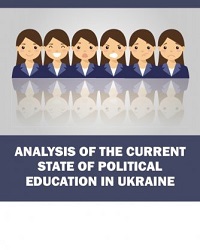
One of the main problems of modern Ukrainian society is the lack of political responsibility of officials and political education of citizens. Political education encourages people to acquire new knowledge and their participation in public affairs, to form responsible interaction and cooperation of citizens with the authorities. Democratic regime establishing and civil society building is impossible without participating in the process of political decisions-making of active and conscious citizens who are capable of realizing their rights and being responsible to the community and society for their actions. In order to be able to do this, the citizen must understand the social and political reality and the processes that take place in it. Political education is aimed at creating a critical mass of citizens who have comprehensive and reliable information about political reality, independently and critically form their own opinions and are ready for public activity. It acts as a vital element not only in the construction and establishment of a democratic civil state, but also in the development and effective functioning of all spheres of social life.
More...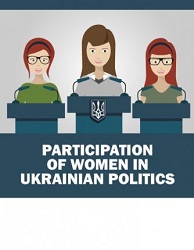
The aim of the research is to carry out the analysis of actions taken by Ukrainian political parties in order to increase the level of women involvement in the policies development and to identify the main challenges at the interparty and cross-party levels. The reforms which are carried out in Ukraine after the Revolution of Dignity offer significant opportunities for the implementation of the best European and international practices in the field of gender equality. In particular,amendments to the electoral legislation pertaining to introduction of gender quotas offer the opportunities for increased involvement of women in political activity. On-going constitutional process makes it possible to incorporate the principles of gender equality in a new draft of the Constitution of Ukraine. The EU-Ukraine Association Agreement envisages implementation of a number of EU directives pertaining to non-discrimination and gendere quality in Ukrainian legislation and daily practice. Administrative reform allows to raise the issue of vertical gender segregation in the state executive bodies. Local government reforms and decentralization process provide anopportunity to promote gender equality mechanism at the level of regions, districts, individual settlements, and amalgamated communities.
More...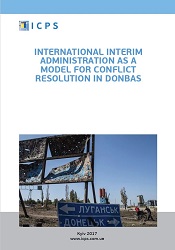
Keywords: Minsk agreements;
Two years have passed since the Minsk agreements were approved. The agreements were endorsed by the UN Security Council Resolution 2202 on February 17, 2015 as a tool of conflict resolution in eastern Ukraine. Minsk-2 contributed to de-escalation of the conflict and suspension of full-scale fighting, but not to the conflict settlement. If the Minsk agreements remain as a “no-alternative-mechanism” for conflict settlement in the east of our country, their implementation will require new, additional instruments which are prescribed by the Minsk agreements, but do not contradict to them. The introductionof the International Interim Administration (IIA) under the UN auspices in the non-controlled territories can be one of such innovative tools for the conflict settlement in Donbas. IIA can become acceptable to all conflict parties and a ‘model’ of the Minsk agreements implementation and restoration of Ukraine’s sovereignty over certain areas of Donetsk and Luhansk regions.
More...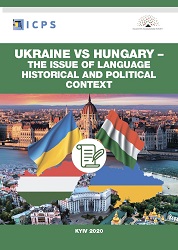
The issue with regard to the status of Ukrainian language has deep historical roots and is directly related to how it is used in modern political realities. For almost its entire history, Ukrainehas been under influence (or a part) of other states, knowing no independence: from the Grand Duchy of Lithuania to the incorporation of Ukraine into the Soviet Union. The vast majority of these states’ humanitarian policy, which at different times included Ukrainian lands, was aimed at assimilating the Ukrainian population. This was done most acutely and aggressively by Russian state authorities (being the Russian Empire or the Soviet Union). This led to the complete politicization of the language issue in Ukrainian society and the formation of Russian propaganda myths about both countries being “one nation”, “Ukraine is a younger brother of Russia”, etc. Additionally, there were even more radical theses introduced about the Ukrainian language not being self-sufficient, only existingas a form of a “South Russian dialect”. These claims are perceived as a national humiliation in Ukraine.
More...